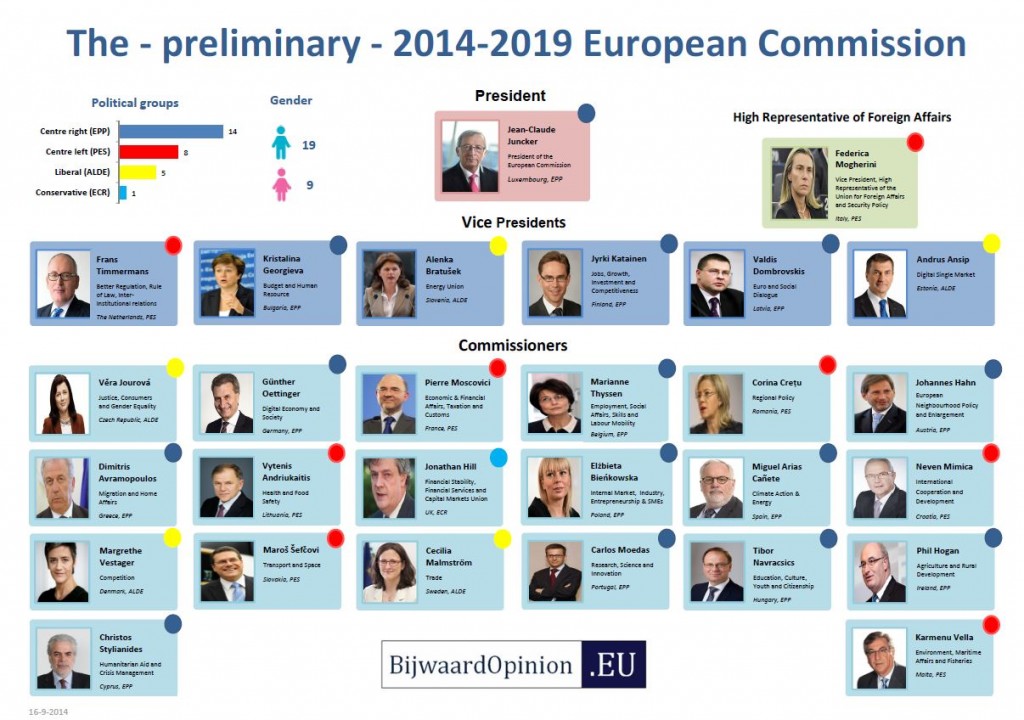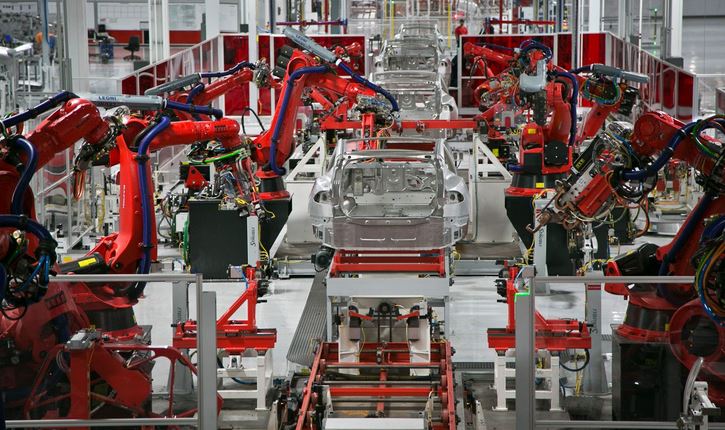Europe a paradise? When in 2004 American author Jeremy Rifkin wrote his book “The European Dream” this was a bold statement, but also a statement that did not appear that far-fetched. Why wouldn’t the European Union, with its social market economy and ‘soft power’, become a model for the 21st century world? Ten years later this kind of optimism about Europe’s future is rare to say the least. “The power of paradise” [“De kracht van het paradijs” in Dutch], the title of the recent book of Flemish Professor Jonathan Holslag, is therefore remarkable. Does Holslag go against the dominant Eurosceptic flow? Yes and no. Yes, because “The power of paradise” is a pro-European book in which Hoslag encourages EU Member States to integrate further. No, because Holslag mercilessly exposes Europe’s European economic, political and military decline. Continue reading [in Dutch]…
Category Archives: New
The 2014-2019 ‘Juncker’ European Commission
At the end of September the hearings by the European Parliament of the Commissioners-designates for the 2014-2019 European Commission will get under way. After having been ‘grilled’, by the European Parliament, the new ‘Juncker Commission’ is expected to take office on 1 November. Worth reading are this EurActiv article on who will hold real power among the 28 new Commissioners, and this EUobserver article on the new power structure of the Juncker Commission. Click on the picture above for my own overview of the Commissioners-designates.
Iran & the European Union’s search for energy diversification
No matter what the outcome of the Ukrainian crisis will be, it seems certain that the relations between the European Union and Russia will remain frosty for the foreseeable future. This will in particular influence the EU’s energy policy, with some previously unthinkable options for energy diversification now becoming feasible. One of these less obvious energy diversification options for European countries may be importing gas from Iran, a country long seen as an enemy of the West, but with the world’s second largest gas reserves. Continue reading…
‘The second machine age’: will automation lead to increasing inequality?
In this thought-provoking article, published in the July/August Foreign Affairs, it is argued that the scarcest, and hence the most valuable, resource in the coming digital era will be neither ordinary labour nor ordinary (physical) capital, but people who can create new ideas and innovations. In this ‘automated economy’, a relatively small number of highly qualified economic ‘top performers’ may reap a disproportionate share of the rewards.:
“The distribution of income for this creative class typically takes the form of a power law, with a small number of winners capturing most of the rewards and a long tail consisting of the rest of the participants. So in the future, ideas will be the real scarce inputs in the world — scarcer than both labor and capital — and the few who provide good ideas will reap huge rewards. Assuring an acceptable standard of living for the rest and building inclusive economies and societies will become increasingly important challenges in the years to come.” Link to the article
Boekbespreking: Duco Hellema, Nederland en de jaren zeventig
Wat was kenmerkend voor de jaren zeventig, Dolle Mina of de opkomst van de Evangelische Omroep? Oftewel, vormden de jaren zeventig in Nederland een hoogtepunt van de progressieve protestbeweging, of was dit een decennium waarin een hernieuwd conservatisme op de voorgrond trad? Hoogleraar Internationale Betrekkingen Duco Hellema geeft in zijn nieuwe boek Nederland en de jaren zeventig weer hoe de jaren zeventig in Nederland inderdaad een ‘rood’ decennium waren, maar dat tegelijk ook de conservatieve en neoliberale golf van de volgende decennia begon aan te zwellen. Lees verder…
Boekbespreking: H.L. Wesseling, De man die nee zei, Charles de Gaulle 1890-1970
Charles de Gaulle heeft de status van oorlogsheld, maar zijn politieke rol na de Oorlog is controversieel geweest. Dit was zeker het geval in Nederland, waar De Gaulle het prototype was van de arrogante fransman. In zijn zeer aan te bevelen boek over De Gaulle, ‘De man die nee zei’, geeft de historicus H.L. Wesseling aan hoe dit imago tot stand kwam en waarom De Gaulle niettemin een groot staatsman was met een cruciale rol in de vorming van het moderne Frankrijk en Europa. Lees verder…
Het Franse buitenlands beleid onder Hollande
Vijf maanden na de Franse verkiezingen voelt François Hollande al als het vertrouwde gezicht van Frankrijk op het internationale toneel. Wat is er eigenlijk veranderd sinds Sarkozy? Voert “le président normal” grote beleidswijzigingen in de Franse buitenlandpolitiek door? Of is er sprake van continuïteit? Interessante vragen, zeker ook voor het Europese buitenlands beleid, en dus voor Nederland. Een gemeenschappelijke Europese buitenlandpolitiek bestaat immers enkel bij overeenstemming tussen de grote lidstaten.Lees verder…



